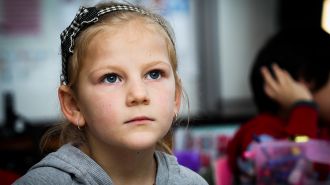
- Our studies
- Our research
- Publications and resources
- Data access and training
- About
- News
- Events
- Get in touch
- Join our mailing list

Welcome to our news and blogs section. Here you’ll find the latest developments and insights from across our longitudinal studies.
Young people from more deprived neighbourhoods have to wait up to 15 minutes longer for accident and emergency (A&E) treatment than their more advantaged peers with similar healthcare needs, according to new findings from Next Steps.

Breastfeeding matters for children’s cognitive development, but disadvantaged mothers who give birth at the weekend are less likely to breastfeed, owing to poorer breastfeeding support in hospitals, finds a new UCL study.

Inequalities in the early cognitive, social and emotional development of children in the UK, which are so important in shaping later life outcomes, have changed little between those born in the early 2000s and those born in the early 2010s. Researchers from the UCL Centre for Longitudinal Studies (CLS) and the Institute for Fiscal Studies […]

Children conceived through medically assisted reproduction who are born small do just as well in cognitive tests during childhood and adolescence as naturally conceived children who are born a normal weight, finds a new study led by UCL researchers.

Millennium Cohort Study findings have provided evidence for The Children’s Society’s eighth annual Good Childhood Report, which examines the state of children’s wellbeing across the UK.
At this event, organised by CLOSER, we will present results on the measurement properties of mental health measures, before and after harmonising these so that they can be compared across time and study.
CLS are pleased to be presenting at this CLOSER workshop aimed at lecturers. This free one-day workshop will give an overview of longitudinal data available to lecturers who teach and supervise students in quantitative social science subjects.
Held at the University of Edinburgh, this workshop gave both first-time and more experienced data users an insight into four of the UK’s internationally-renowned cohort studies run by the Centre for Longitudinal Studies (CLS). The slides from this workshop are available to download from this page.

High BMI and mental ill-health go increasingly hand-in-hand to present a combined health risk for children from mid-childhood, according to a new study.

Children who experience a family break-up in late childhood and early adolescence are more likely to have emotional and behavioural problems than those living with both parents, according to a new study.

Children born to immigrant parents tended to trail behind their peers in reading and maths in the 1970s and 1980s, largely due to their social background.

Researchers have failed to find a causal link between children’s development and their relationships with their grandparents.

Up to 1 in 5 children in the poorest fifth of families display symptoms of mental illness, compared to 1 in 20 children from the richest homes. But according to a new study, mothers’ mental health matters even more.
Ryan Bradshaw
Senior Communications Officer
Phone: 020 7612 6516
Email: r.bradshaw@ucl.ac.uk